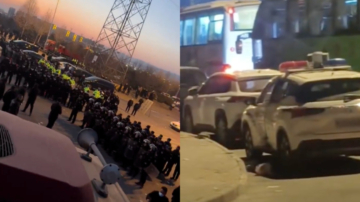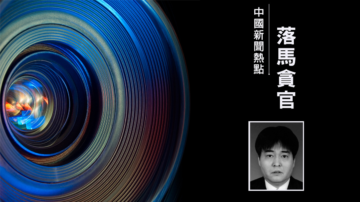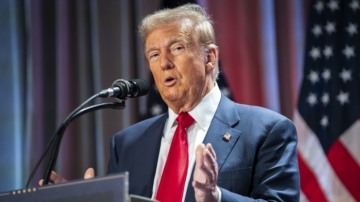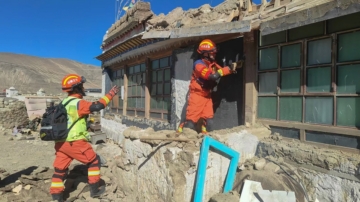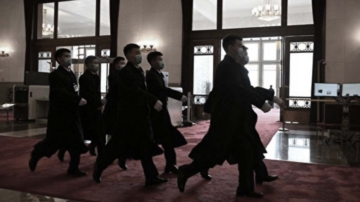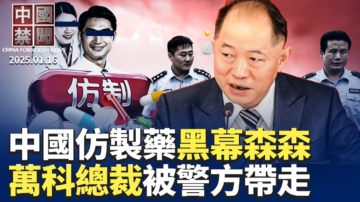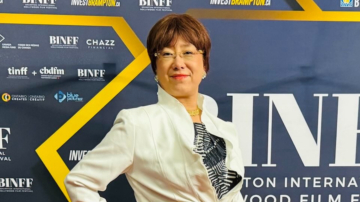【新唐人2012年7月17日讯】中国与邻国在东海和南海的主权纠纷日趋激烈的同时,日本军方本年度的《防卫白皮书》也即将出笼。今年的白皮书再次把矛头对准中国,并拿中共党与军队关系做话题,强调中国日益强盛的军力将对日本构成威胁,日本应提高戒备。外界认为,王立军事件导致世界更加谨慎中共的破坏性,各国都在关注中共18大会给全球带来甚么影响。
日本今年的白皮书预计要到本月底或下月初才公布,日本《读卖新闻》日前率先披露部分内容,其中特别谈到中共“党与军队”关系,认为中共党军关系出现变化,需要特别关注。
报导指称,中共历来奉行“党指挥枪”原则,而近年来军方势力抬头,影响力增大,军方对外交的“危机管理决策”影响日增,加上国防开支在过去24年间“急剧增加约30倍”,以及军方研发新战机及翻新航空母舰,海军舰艇在日本附近太平洋进进出出等,反映中国军方正提高远洋作战能力,日本应提高戒备。
时事评论员蓝述表示,周边国家担心在中国目前政局不稳的情况下,中共内部博弈双方都会讨好军方,满足好战“鹰派”的需要,对外发动战争,同时转移内部矛盾。
时事评论员蓝述:“这些中国周边的国家,让他们所感到焦虑的不是中国也不是中国人,而是中共的这个政治体制,因为这个政治体制造成了深刻的社会矛盾,造成了中国社会的不稳定,这种体制的本身能够达到18大权力交接的顺利进行,有可能把中国这种深刻的矛盾向外输出,掩盖目前中国内部的矛盾。”
蓝述还表示,国际社会深知中国的军队不属于国家。他说,中共历次政治斗争中,都是谁掌握了军权,谁就掌握了政权,国际社会对中国的担忧实际上是因为对中共的恐惧。
蓝述:“日本这次最新白皮书的出炉,不仅反映了日本政府和日本的民间,对中共在18大目前所处在高层分崩的这种形势的关注,也体现了整个国际社会,是否中共高层的分崩会导致中国社会大幅度的社会动荡表示关注,因为众所周知,中国的军队,它是一个党卫军。”
蓝述说中国的军方存在三种势力,一方是太子党,一方是江泽民一手栽培的腐败势力,另一方是要求军队国家化的开明派,这三方势力不分上下,各不相让。
前几个月的中共高层博弈中,中共国家主席胡锦涛对政法委和武警部队进行了大幅度调整,军队高层也重新洗牌,军中头脑纷纷向胡锦涛表示效忠。
不过《中国事务》杂志主编伍凡认为,军中头脑虽然向胡锦涛表忠心,但并不意味着军心稳定。
《中国事务》主编伍凡:“但是现在他也不得不忠诚,为甚么,军队靠谁养,要靠财政部拨款,所以他就为了这些钱,他也要装模作样,我对你真诚啊,还有,这些军官提升靠谁提,是靠军委主席或者大军区司令,我得靠你提拔我。”
伍凡指出,日本担心中国变成军国主义国家,对它进行威胁。
就在中日东海纠纷日趋激化的同时,日本驻华大使丹羽宇一郎日前“被奉召回国”。外界认为,也许是因为他批评东京购买钓鱼岛,引起日本舆论不满,当局要“换马”。但丹羽宇一郎15号在北京机场宣称,他回国是报告有关钓鱼岛事件的最新发展,完成报告后会返回北京。但舆论认为,作为外交惯例,大使“临时回国”常作为对抗措施使用。
报导说,丹羽宇一郎16号返回中国。不过日本外相玄叶光一郎在与丹羽宇一郎会谈后说,已再次要求丹羽准确传达日本的想法,会谈中没有谈到是否撤换丹羽。
采访编辑/刘惠 后制/萧宇
Japanese Defense White Paper Pays Attention
to China’s Internal Affairs for First Time
While China is going through increasingly fierce disputes
over sovereignty with its neighbors in the East China Sea
and South China Sea, the Japanese military's Defense
White Paper (White Paper) is due to be released.
The White Paper this year again targets China, discussing
the relationship between the Chinese Communist Party (CCP), and the Chinese military.
It emphasizes that the growing strength of China's military
constitutes a threat to Japan. Japan should be on alert.
Observers believe the “Wang Lijun Event” has lead to caution
around the world toward the destructive nature of the CCP.
Each country is watching the CCP 18th Congress
and its impact on the world.
Japans’ White Paper will be published
around the end of July or early August.
Japan’s Yomiuri News has revealed some of its contents.
It especially discusses the CCP’s relationship with Chinese
society, and the ongoing changes of that relationship.
The report points out that the CCP has followed
the principle of “CCP Leading the Military.”
Recently, the military has been getting stronger,
with greater impact on foreign policies.
The national defense budget has increased sharply
about thirty times in the past twenty-four years.
In addition, newly developed warships and flight carriers,
as well as with ships cruising in seas close to Japan,
reflect that China’s military is improving it’s naval capacity,
and so Japan should be on heightened alert.
Commentator Lan Shu said that China’s neighboring
countries are worried about China's political instability.
Each faction in China’s internal struggle
will ask for allegiance from the military.
It will cater for the military’s need in launching
wars, and shifting internal conflicts.
Lan Shu: “These neighboring countries
are not worried about China or Chinese people.
They are concerned about the CCP’s social system.
The CCP system has resulted in profound
social conflicts and instabilities.
In order to ensure power transition in the 18th Congress,
the CCP might export its problems and cover up conflicts.”
Lan Shu also expressed that the international society
is fully aware the CCP military does not belong to China.
He said that during the many CCP political movements,
whoever has the military will take the power.
The concern of the international society
toward China is actually concern over the CCP.
Lan Shu: “The latest White Paper from Japan not only
reflects the attention of the Japanese government
and the Japanese people on the internal CCP conflicts
before the 18th Congress.
It also reflects the attention of the international
towards China’s social instability.
Everyone knows China’s military belongs to the CCP."
Lan Shu said China’s military has three power factions.
It has the ‘crown prince’ faction, Jiang Zemin’s faction
and the group asking to nationalize the military.
The three power groups have equal strength,
and none of them will give in to the others.
During the high-level internal conflicts a few months ago,
the CCP’s president Hu Jintao has conducted large-scale
changes to the Committee of Political and Legislative
Committee, as well as the military police.
High-level military officials were also re-arranged.
Military leaders all show loyalty towards Hu Jintao.
However, Wu Fan, the Chief Editor of China Affairs
thinks that
although leaders of the military show loyalty to Hu,
it does not mean they are stable in their attitude.
Wu Fan: “They have to be loyal now. The military
depends on the government, so it has to show loyalty.
Their promotion is also given
by the military committee chairman.”
Wu Fan points out that Japan is worried that China
will turn into a country led by a military power.
Along with disputes over the Eastern China Sea, Japan’s
Ambassador to China, Uichiro Niwa, was also recently called back to Japan.
His criticism over Tokyo’s purchase of Diao Yu Island
caused dissatisfaction among Japanese media.
However, Uichiro Niwa claimed at the Beijing Airport
that his returning to Japan is to report latest developments.
According to media, the sudden calling back
of the ambassador is measured used against resistance.
The report stated that Uichiro Niwa is returning to China
on July 16, but did not mention if he will be replaced.
However, Japan’s foreign minister Kōichirō Gemba,
met with Uichiro Niwa and asked him to accurately convey Japan’s policy.
日本今年的白皮书预计要到本月底或下月初才公布,日本《读卖新闻》日前率先披露部分内容,其中特别谈到中共“党与军队”关系,认为中共党军关系出现变化,需要特别关注。
报导指称,中共历来奉行“党指挥枪”原则,而近年来军方势力抬头,影响力增大,军方对外交的“危机管理决策”影响日增,加上国防开支在过去24年间“急剧增加约30倍”,以及军方研发新战机及翻新航空母舰,海军舰艇在日本附近太平洋进进出出等,反映中国军方正提高远洋作战能力,日本应提高戒备。
时事评论员蓝述表示,周边国家担心在中国目前政局不稳的情况下,中共内部博弈双方都会讨好军方,满足好战“鹰派”的需要,对外发动战争,同时转移内部矛盾。
时事评论员蓝述:“这些中国周边的国家,让他们所感到焦虑的不是中国也不是中国人,而是中共的这个政治体制,因为这个政治体制造成了深刻的社会矛盾,造成了中国社会的不稳定,这种体制的本身能够达到18大权力交接的顺利进行,有可能把中国这种深刻的矛盾向外输出,掩盖目前中国内部的矛盾。”
蓝述还表示,国际社会深知中国的军队不属于国家。他说,中共历次政治斗争中,都是谁掌握了军权,谁就掌握了政权,国际社会对中国的担忧实际上是因为对中共的恐惧。
蓝述:“日本这次最新白皮书的出炉,不仅反映了日本政府和日本的民间,对中共在18大目前所处在高层分崩的这种形势的关注,也体现了整个国际社会,是否中共高层的分崩会导致中国社会大幅度的社会动荡表示关注,因为众所周知,中国的军队,它是一个党卫军。”
蓝述说中国的军方存在三种势力,一方是太子党,一方是江泽民一手栽培的腐败势力,另一方是要求军队国家化的开明派,这三方势力不分上下,各不相让。
前几个月的中共高层博弈中,中共国家主席胡锦涛对政法委和武警部队进行了大幅度调整,军队高层也重新洗牌,军中头脑纷纷向胡锦涛表示效忠。
不过《中国事务》杂志主编伍凡认为,军中头脑虽然向胡锦涛表忠心,但并不意味着军心稳定。
《中国事务》主编伍凡:“但是现在他也不得不忠诚,为甚么,军队靠谁养,要靠财政部拨款,所以他就为了这些钱,他也要装模作样,我对你真诚啊,还有,这些军官提升靠谁提,是靠军委主席或者大军区司令,我得靠你提拔我。”
伍凡指出,日本担心中国变成军国主义国家,对它进行威胁。
就在中日东海纠纷日趋激化的同时,日本驻华大使丹羽宇一郎日前“被奉召回国”。外界认为,也许是因为他批评东京购买钓鱼岛,引起日本舆论不满,当局要“换马”。但丹羽宇一郎15号在北京机场宣称,他回国是报告有关钓鱼岛事件的最新发展,完成报告后会返回北京。但舆论认为,作为外交惯例,大使“临时回国”常作为对抗措施使用。
报导说,丹羽宇一郎16号返回中国。不过日本外相玄叶光一郎在与丹羽宇一郎会谈后说,已再次要求丹羽准确传达日本的想法,会谈中没有谈到是否撤换丹羽。
采访编辑/刘惠 后制/萧宇
Japanese Defense White Paper Pays Attention
to China’s Internal Affairs for First Time
While China is going through increasingly fierce disputes
over sovereignty with its neighbors in the East China Sea
and South China Sea, the Japanese military's Defense
White Paper (White Paper) is due to be released.
The White Paper this year again targets China, discussing
the relationship between the Chinese Communist Party (CCP), and the Chinese military.
It emphasizes that the growing strength of China's military
constitutes a threat to Japan. Japan should be on alert.
Observers believe the “Wang Lijun Event” has lead to caution
around the world toward the destructive nature of the CCP.
Each country is watching the CCP 18th Congress
and its impact on the world.
Japans’ White Paper will be published
around the end of July or early August.
Japan’s Yomiuri News has revealed some of its contents.
It especially discusses the CCP’s relationship with Chinese
society, and the ongoing changes of that relationship.
The report points out that the CCP has followed
the principle of “CCP Leading the Military.”
Recently, the military has been getting stronger,
with greater impact on foreign policies.
The national defense budget has increased sharply
about thirty times in the past twenty-four years.
In addition, newly developed warships and flight carriers,
as well as with ships cruising in seas close to Japan,
reflect that China’s military is improving it’s naval capacity,
and so Japan should be on heightened alert.
Commentator Lan Shu said that China’s neighboring
countries are worried about China's political instability.
Each faction in China’s internal struggle
will ask for allegiance from the military.
It will cater for the military’s need in launching
wars, and shifting internal conflicts.
Lan Shu: “These neighboring countries
are not worried about China or Chinese people.
They are concerned about the CCP’s social system.
The CCP system has resulted in profound
social conflicts and instabilities.
In order to ensure power transition in the 18th Congress,
the CCP might export its problems and cover up conflicts.”
Lan Shu also expressed that the international society
is fully aware the CCP military does not belong to China.
He said that during the many CCP political movements,
whoever has the military will take the power.
The concern of the international society
toward China is actually concern over the CCP.
Lan Shu: “The latest White Paper from Japan not only
reflects the attention of the Japanese government
and the Japanese people on the internal CCP conflicts
before the 18th Congress.
It also reflects the attention of the international
towards China’s social instability.
Everyone knows China’s military belongs to the CCP."
Lan Shu said China’s military has three power factions.
It has the ‘crown prince’ faction, Jiang Zemin’s faction
and the group asking to nationalize the military.
The three power groups have equal strength,
and none of them will give in to the others.
During the high-level internal conflicts a few months ago,
the CCP’s president Hu Jintao has conducted large-scale
changes to the Committee of Political and Legislative
Committee, as well as the military police.
High-level military officials were also re-arranged.
Military leaders all show loyalty towards Hu Jintao.
However, Wu Fan, the Chief Editor of China Affairs
thinks that
although leaders of the military show loyalty to Hu,
it does not mean they are stable in their attitude.
Wu Fan: “They have to be loyal now. The military
depends on the government, so it has to show loyalty.
Their promotion is also given
by the military committee chairman.”
Wu Fan points out that Japan is worried that China
will turn into a country led by a military power.
Along with disputes over the Eastern China Sea, Japan’s
Ambassador to China, Uichiro Niwa, was also recently called back to Japan.
His criticism over Tokyo’s purchase of Diao Yu Island
caused dissatisfaction among Japanese media.
However, Uichiro Niwa claimed at the Beijing Airport
that his returning to Japan is to report latest developments.
According to media, the sudden calling back
of the ambassador is measured used against resistance.
The report stated that Uichiro Niwa is returning to China
on July 16, but did not mention if he will be replaced.
However, Japan’s foreign minister Kōichirō Gemba,
met with Uichiro Niwa and asked him to accurately convey Japan’s policy.

